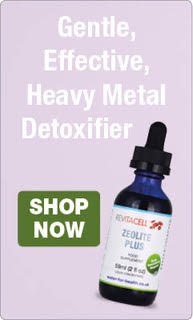In our ever-more polluted world, it’s becoming imperative to understand how to detoxify heavy metals and other persistent toxins.
Dehydration is a common symptom of heavy metals in the body. Heavy metals are found in foods, medicines, via industrial exposure, lead-based paints, by the ingestion of pesticides, herbicides, and insecticides.
Yep, there’s pretty much no way to avoid heavy metals in modern society!
That’s why understanding how to detoxify your body is key.
Glutathione is naturally produced by your liver and is important for tissue building and repair. It contains 3 amino acids: cysteine, glutamate, and glycine.
Glutathione is involved in the detoxification of poisons and toxins in the liver, lungs, intestines, and kidneys. The most impressive function of glutathione is in the detoxification of heavy metals. Glutathione is essential in the proper functioning of the immune system, and also helps to boost longevity.
Read on to learn more about glutathione – and particularly the S-acetyl form…
How Does Glutathione Detox the Body?
Glutathione plays an important role in the detoxification of the body.
One way it works is by turning fat-soluble toxins into water-soluble toxins so that your body can eliminate harmful waste.
Without adequate amounts of glutathione, toxins like free radicals would accumulate in fat stores.
Glutathione alone can eliminate free radicals, as well as dealing directly with causes of oxidative stress (such as heavy metals and toxins).
Glutathione’s critical roles in the body cannot be overstated. It regulates the growth of cells as well as apoptosis (the death of cells). Glutathione can also harvest and transport mercury out of brain cells.
As well as being a cofactor for several antioxidant enzymes, glutathione regenerates vitamin C and E stores, further enhancing detoxification.
Glutathione is also vital to mitochondrial DNA functioning. Helping the body energise and stay well.
Glutathione vs Acetyl Glutathione
People often ask if glutathione is the same as acetyl glutathione.
While glutathione is quite rightly known as the “master antioxidant,” when taken orally it’s a different story. Glutathione alone is not well absorbed by the body when taken orally.
That’s because it breaks down in the gastrointestinal tract. Glutathione is therefore known to have low bioavailability. Which is where acetyl glutathione comes in.
Adding the acetyl group provides protection for the glutathione molecule. Allowing the body to absorb more glutathione directly into cells.
If you’re looking for high doses of glutathione, then opting for acetyl glutathione is the best option. Vitamin B6 also helps in the absorption of glutathione.
Related: Do You Need to Detoxify Heavy Metals to Reduce EMF Impact?
Glutathione (GSH) and the Kidneys
Although an adequate amount of glutathione is necessary for the kidneys to function properly, we must observe balance.
Glutathione production may be impacted in people with alcoholism or liver disease. For this reason, supplementation might be critical. However, like most things, too much of a good thing can turn bad.
High doses of glutathione are particularly useful for those with fatty liver disease. One study showed that cellular damage in the liver was reduced with IV glutathione.
Glutathione works in the kidneys to reduce the damage from toxins passing through, as well as helping the body turn fatty toxins into water-soluble toxins to be removed by the kidneys.
Boost Glutathione Levels with These Foods
There are several whole foods that are thought to boost glutathione levels. As such, it’s a good idea to incorporate them into your diet. These foods include:
Conclusion
Glutathione production may be impacted in people with alcoholism or liver disease. For this reason, supplementation might be critical.
Glutathione is quite rightly known as the master detoxifier. Present in all cells, it helps protect and remove free radicals and toxins from the body. Thus reducing oxidative stress and boosting the immune system.
As with many things, a healthy lifestyle will help your body produce enough glutathione. However, some diseases, particularly in the liver, reduce the amount of cellular glutathione available to us.
Making supplementation and proper dietary practices a high priority for optimal health and wellbeing.
Written by best-selling author and integrative nutrition health coach Rowanna Watson, who has a passion for natural health. Rowanna is an expert in all areas of holistic health, plant-based nutrition, detoxification and personal development.
Water for Health Ltd began trading in 2007 with the goal of positively affecting the lives of many. We still retain that mission because we believe that proper hydration and nutrition can make a massive difference to people’s health and quality of life. Click here to find out more.




























Leave a comment